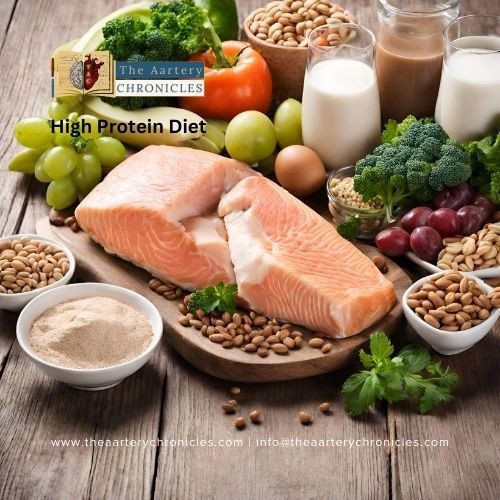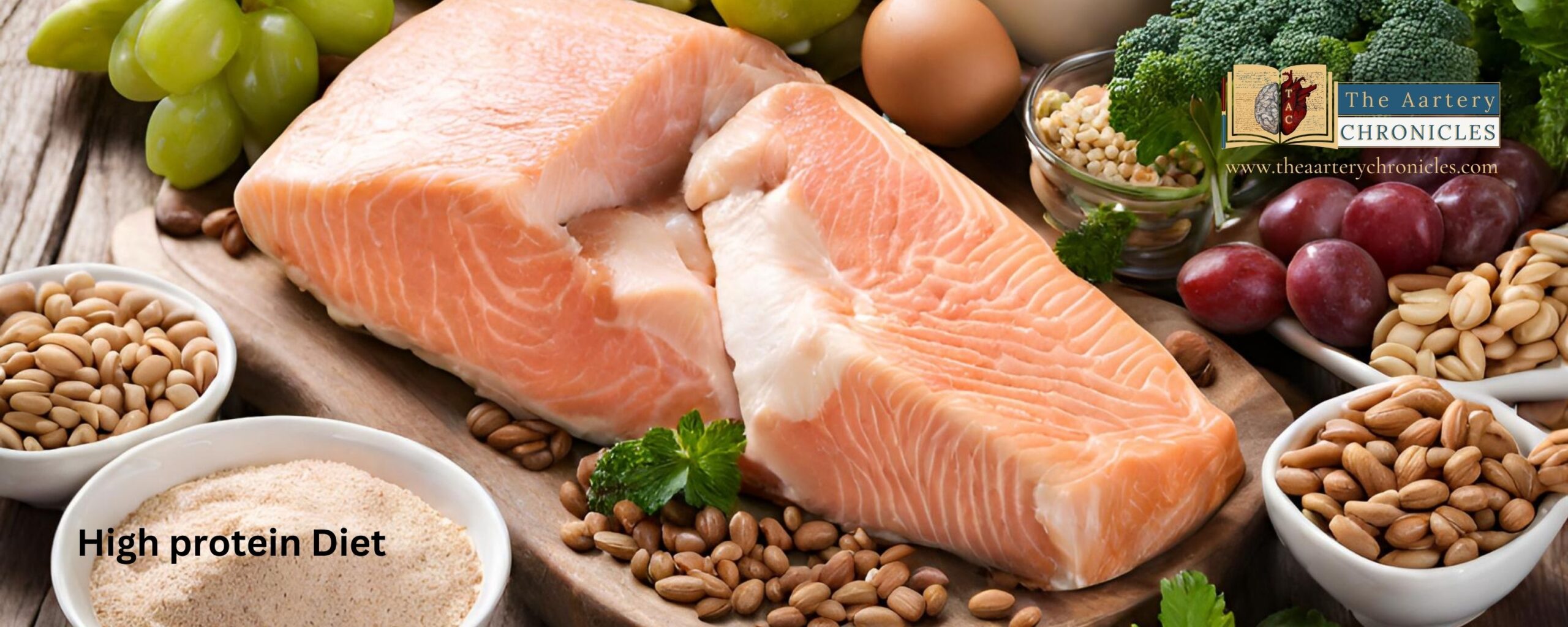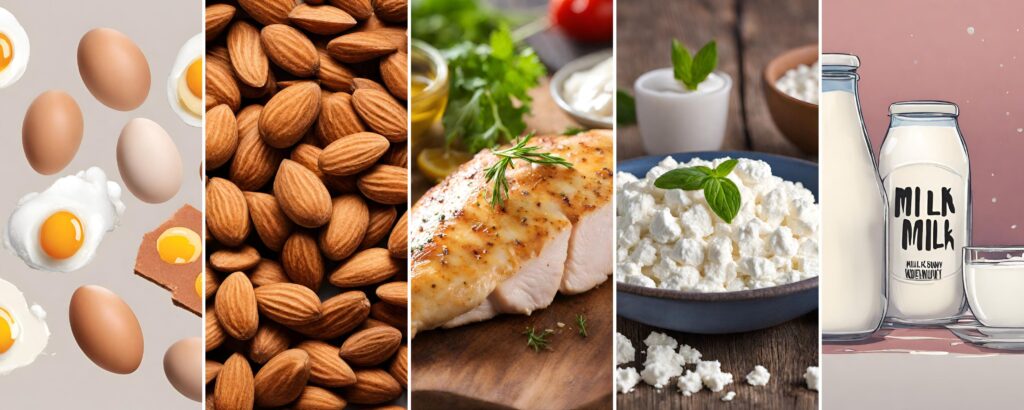

Proteins: Importance, Sources, and Benefits of a High-Protein Diet
Ever wondered why proteins are the superheroes of your body? Let’s dive into the essence of proteins through this article and identify their crucial roles.
What are proteins?
Proteins, constituting a substantial portion of cellular dry weight, play a fundamental role in various cellular functions.
Their versatility enables them to fulfil various roles, ranging from providing structural support to orchestrating cell signalling and enabling cellular movement. This multifunctionality is why proteins are widely recognized as the building blocks of life.
Noteworthy protein examples encompass antibodies, enzymes, and specific hormones like insulin. Despite their diverse functionalities, proteins universally originate from a standard set of 20 amino acids. These crucial building blocks are acquired through the consumption of plant and animal foods, emphasizing the essential role of diet in ensuring a sufficient supply of amino acids for protein synthesis.
Why are proteins so essential?
As architects of growth and development, proteins play a crucial role in repairing and building cells and tissues, particularly the muscles that keep you in motion. Yet, their significance doesn’t end there – proteins also act as the stage managers for vital bodily processes such as blood clotting, maintaining fluid balance, and orchestrating the defence system known as the immune response
Are there any Dietary Considerations for “High Protein” Intake? Any guidelines or recommendations?
Dietary considerations for high protein intake encompass various aspects, including
- Adherence to a protein percentage in caloric intake, with emphasis on diets where protein constitutes more than 25% of the total calorie content.
- Individualized protein intake for “high protein diet” recommendations involves consuming 1.6 grams of protein per kilogram of body weight.
Furthermore, some dietary patterns exceed the recommended guidelines, surpassing the Recommended Daily Allowance (RDA) for protein, which is typically set at 0.8 grams per kilogram of body weight

Which foods boast a high protein content?
The range of foods that boast a high protein content may include:
- Eggs: One large egg (50g) packs a punch with 6.3g protein.
- Almonds: In just one ounce (28.35g), almonds deliver 6g of protein.
- Chicken Breast: Half a chicken breast (86g) serves 26.7g of protein.
- Cottage Cheese: A cup (226g) of cottage cheese brings a substantial 28g protein.
- Greek Yogurt: A 7-ounce (200g) serving boasts 19.9g of protein.
- Milk: One cup (246mL) delivers 8.32g of protein.
- Lentils: 100g of cooked lentils serves up 9.02g of protein.
- Lean Beef: A 3-ounce (85g) serving provides a robust 24.6g protein.
- Fish: Protein content varies, with a half salmon fillet (124g) delivering 30.5g.
- Quinoa: A cup (185g) of cooked quinoa contributes 8g of protein.
- Ezekiel Bread: Each slice (50g) brings 6g of protein to your plate.
- Pumpkin Seeds: 1/4 cup (29.5g) contains 8.8g of protein.
- Turkey Breast: A 3-ounce (85g) serving offers a generous 25.6g protein.
- Shellfish: Protein content varies, with cooked clams providing 21.8g and shrimp delivering 20.4g per 3-ounce (85g) serving.
- Peanuts and Peanut Butter: Peanuts and peanut butter offer a substantial protein boost.
Protein Powders: Whey protein powder offers about 16.6g & pea protein delivers 15g per scoop.
Celebrities and fitness enthusiasts often endorse the advantages of protein powders, especially beneficial for individuals adhering to vegetarian diets and participating in rigorous workouts. These powders offer a convenient and efficient means of supplementing protein intake, addressing the challenge of meeting elevated protein requirements during intense training. For vegetarians, obtaining sufficient protein solely from plant-based sources can be challenging. Protein powders, typically derived from various plant-based sources like peas, rice, hemp, or soy, provide a complete amino acid profile essential for muscle repair and growth.
Protein powder is a concentrated form of protein extracted from various sources, like from milk: whey, casein., plant-based protein: soy, and peas. Protein powder is a convenient way to supplement protein intake for muscle repair and growth after workouts. Consuming protein post-exercise optimises the anabolic window, enhancing the effectiveness of my training. Depending on the workout timings morning or evening, I blend the protein powder with water or milk accordingly and for more nutrition/fibre and taste I sometimes add fruits like banana and grains such as oats which provides a quick and easily digestible source of protein. Choose a protein powder based on your dietary preferences, allergies, and fitness goals. Always read labels for added ingredients and consult with a healthcare or nutrition professional if needed
Harpreet kaur, Fitness enthusiast, Miss India Europe, Belgium 2014
Benefits of a high protein diet
The potential benefits of a high-protein diet, particularly in supporting muscle mass, weight loss, and cognitive health.
Preserving or Building Muscle Mass:
A diet high in protein supports muscle repair and growth. It plays a crucial role in strengthening and revitalizing your muscles. Additionally, it promotes the development of lean muscle mass and contributes to improved bone health.
Supporting Weight Loss:
High-protein diets may contribute to weight loss and help prevent the often-dreaded weight regain following successful weight loss efforts. Numerous ongoing studies aim to deepen our understanding, particularly through research spanning longer durations. Higher protein intake tends to reduce feelings of hunger, thereby facilitating weight loss.
Additional Advantages:
The role of plant-based protein in promoting cognitive health is noteworthy. Study shows consuming plant-based protein reduces the risk of dementia. Substituting 5% of calories from carbohydrates with plant protein was associated with a remarkable 26% lower likelihood of developing dementia. This suggests that plant proteins may offer more benefits than animal-based proteins.

Can high protein consumption pose health risks?
Is high protein consumption good? Yes, but in moderation.
Excess of anything is not good or beneficial, and overconsumption of protein can lead to health issues. Numerous studies indicate that a diet excessively high in animal protein may contribute to the formation of renal calculi or kidney stones. Such imbalances in protein intake can result in dietary imbalance, necessitating the importance of maintaining a well-rounded and balanced diet.
What is the recommended daily protein intake?
The Recommended daily protein intake varies depending on activity levels:
- For individuals with low activity, a general guideline is to consume 0.8g of protein per kilogram of body weight.
- For those leading active lifestyles, the recommendation ranges from 1 to 1.2g of protein per kilogram of body weight.
- Athletes engaged in intense physical activity may benefit from a higher protein intake, ranging from 1.2 to 2g per kilogram of body weight.
Much like fine wine, an individual’s protein requirements evolve through various life stages. Children and teenagers require increased protein for growth, while adults should adjust their intake to support their bodies gracefully as they age.

Author: Priya Bairagi
- Medicine and Diseases
- Nutrition and Diet
Lorem ipsum dolor sit amet, consectetur adipiscing elit. Ut elit tellus, luctus nec ullamcorper mattis, pulvinar dapibus leo.
















